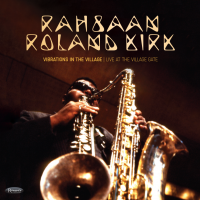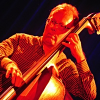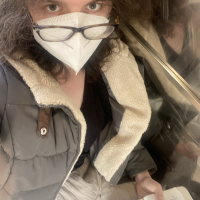Home » Jazz Musicians » Henry Grimes
Henry Grimes
Master jazz musician (acoustic bass, violin, poetry) HENRY GRIMES has played more than 600 concerts in 30 countries (including many festivals) since 2OO3, when he made his astonishing return to the music world after 35 years away. He was born and raised in Philadelphia and attended the Mastbaum School and Juilliard. As a youngster in the '50s and early '60s, he came up in the music playing and touring with Willis "Gator Tail" Jackson, Arnett Cobb, "Bullmoose" Jackson, "Little" Willie John, and a number of other great R&B / soul musicians; at Juilliard he played classical music on bass with the opera orchestra and studied with the great Fred Zimmermann, principal bassist of the New York Philharmonic; but drawn to jazz, he went on to play, tour, and record with many great jazz musicians of that era, including Albert Ayler, Don Cherry, Benny Goodman, Coleman Hawkins, Roy Haynes, Lee Konitz, Steve Lacy, Charles Mingus, Gerry Mulligan, Sunny Murray, Sonny Rollins, Pharoah Sanders, Archie Shepp, Cecil Taylor, McCoy Tyner, and Rev. Frank Wright.
Sadly, a trip to the West Coast to work with Al Jarreau and Jon Hendricks went awry, leaving Henry in Los Angeles at the end of the '6O's with a broken bass he couldn't pay to repair, so he sold it for a small sum and faded away from the music world. Many years passed with nothing heard from him, as he lived in his tiny rented room in an S.R.O. hotel in downtown Los Angeles, working as a manual laborer, custodian, and maintenance man, and writing many volumes of handwritten poetry.
He was discovered there by a Georgia social worker and fan named Marshall Marrotte in 2002 and was given a bass by William Parker, and after only a few weeks of ferocious woodshedding, Henry emerged from his room to begin playing concerts around Los Angeles, and shortly afterwards made a triumphant return to New York City in May, '03 to play in the Vision Festival.
Since then, often working as a leader, he has played, toured, and / or recorded with many of this era's music heroes, such as Rashied Ali, Marshall Allen, Fred Anderson, Marilyn Crispell, Ted Curson, Andrew Cyrille, Bill Dixon, Dave Douglas, Andrew Lamb, Edward "Kidd" Jordan, Roscoe Mitchell, David Murray, Amina Claudine Myers, William Parker, Marc Ribot, Wadada Leo Smith, and Cecil Taylor. In the past few years, Henry has also held a number of residencies and offered workshops and master classes on major campuses (including Berklee College of Music, New England Conservatory, Hamilton College of Performing Arts, the University of Michigan at Ann Arbor, CalArts, Mills College, the University of Gloucestershire at Cheltenham, and several more). He can be heard on about a dozen new recordings, made his professional debut on a second instrument (the violin) at Lincoln Center at the age of 70 with Cecil Taylor, has seen the publication of the first volume of his poetry, "Signs Along the Road," and creates illustrations to accompany his new recordings and publications. He has received many honors in recent years, including four Meet the Composer grants and the Lifetime Achievement Award from Arts for Art / Vision Festival in 2016. He can be heard on 90+ recordings on various labels, including Atlantic, Ayler Records, Blue Note, Columbia, ESP-Disk, ILK Music, Impulse!, JazzNewYork Productions, Pi Recordings, Porter Records, Prestige, Riverside, and Verve.
Read moreTags
Rahsaan Roland Kirk: Vibrations In The Village: Live At The Village Gate

by Joshua Weiner
Thankfully, fans of classic jazz rarely have long to wait before another wonderful, previously unreleased treasure drops from the indefatigable producer Zev Feldman and the folks at Resonance Records. A pair of live releases by multi-instrumentalist, showman, and musical conjuror Rahsaan Roland Kirk join the limited-edition vinyl lineup for Record Store Day's Black Friday 2025 event, with a standard CD release one week later. Seek & Listen: Live At The Penthouse (Resonance Records, 2025) documents 1967 performances, while ...
Continue ReadingAlbert Ayler: Live Greenwich Village to Love Cry Revisited

by Giuseppe Segala
Nel 1996, quando fu pubblicata la prima edizione della sua biografia dedicata ad Albert Ayler, Spirits Rejoice!, il contrabbassista e musicologo tedesco Peter Niklas Wilson scriveva nella prefazione: “La sua musica resta controversa: per alcuni fu un profeta, per altri un ciarlatano. (...) Ayler resta oggi tanto controverso quanto esile è la base per una discussione obiettiva sul suo contributo alla musica degli anni Sessanta." Anche tra i colleghi musicisti c'era chi ne apprezzava la potenza innovativa e propulsiva e ...
Continue ReadingMcCoy Tyner / Joe Henderson: Forces Of Nature: Live At Slugs'

by Joshua Weiner
How does one go about nominating Zev Feldman for a Nobel Peace Prize? Time and again, the intrepid “Jazz Detective" tracks down unknown, unheard, un-even-hoped-for sonic artifacts, painstakingly brushes away the audio dust and grime, and puts us front and center at events that rewrite the history of jazz. Forces of Nature: Live at Slugs' another Feldman's project, in collaboration with Blue Note President Don Was, is quite possibly his greatest, a double album of such excitement, beauty, and power ...
Continue ReadingMcCoy Tyner / Joe Henderson: Forces Of Nature: Live At Slugs'

by Mike Jurkovic
When recordings like Forces of Nature: Live at Slugs' seemingly falls from yonder jazz sky, we must stop to thank those swinging stars above for our grand fortune. Because despite all our flaws--a broken politic, a poisoned planet, constant wartime bickering--we are a fortunate, if mostly undeserving, race of peculiarities. That becomes especially apparent when random, instantaneous works of art and human affinity like this grace our path. Located at 242 East 3rd Street between Avenue B and ...
Continue ReadingHasaan Ibn Ali: Reaching For The Stars: Solos/Duos/Trios

by Doug Collette
Since its inception in 2010, Omnivore Recordings has applied a most stringent set of standards to its archival efforts devoted to the disparate likes of Merle Haggard, Maynard Ferguson and the Posies (and no less so in the occasional preparation and release of new content such as Americana master Peter Case). The label has rightly been recognized for its exacting approach to vault exhumations. Perhaps the most laudable of all its campaigns is the one on behalf of ...
Continue ReadingCecil Taylor: With (Exit) To Student Studies Revisited

by Mark Corroto
Documenting the evolution of Cecil Taylor is an undertaking that is way beyond the pay grade of most listeners. Just as in the study of homo sapiens (yes, us) where there is no critical moment (the missing link) that we can definitely pinpoint where our ancestors established language, art and importantly, abstract thought, Taylor's music can be thought of in similar terms. Obviously his approach didn't emerge fully formed. Or did it? No, that is an irrational thought, but a ...
Continue ReadingDon Cherry: Complete Communion & Symphony for Improvisers Revisited

by Stefano Merighi
Di fronte a questi gioielli di Don Cherry degli anni '60 che cosa si può scrivere ancora? Si può solamente invitare ad ascoltarli con orecchie ricettive e lasciarsi andare all'emozione, come scriveva Nat Hentoff nelle sue note originali per Complete Communion, senza perdere molto tempo in analisi formali poco utili. Questa edizione della collana Ezz-thetics fa scorrere per un'ora e venti minuti due opere manifesto della poetica del compositore-improvvisatore-cornettista e polistrumentista, che all'epoca coordinava organici smaglianti ...
Continue ReadingHappy 80th, Henry Grimes

Source:
JazzWax by Marc Myers
Today is Henry Grimes's 80th birthday. While Henry is known as free jazz's most eminent bassist, he also appeared on a significant number of important mainstream jazz albums earlier in his career. Henry's sound has always been strongly supportive as a time-keeper and fiery in intensity, pushing musicians to take creative risks. As Sonny Rollins notes in his forward to Barbara Frenz's new biography of Henry, Music to Silence Music, “Henry's music, the music of the man, has been such ...
read more
Henry Grimes - Four Days in Chicago

Source:
Karl E. H. Seigfried
Karl performed (bass) with Henry Grimes (bass and violin) for four concerts during the Chicago Jazz Festival. Here are details from Neil Tesser's Preview: One event constitutes a miniature festival in its own right, as the resurrected New York bassist Henry Grimes returns to Chicago for a slew of performances. It's no surprise to find Grimes in town during the Festival: he spent the last several Labor Day weekends appearing in multiple contexts at the much-missed Velvet Lounge, the historic ...
read more
Henry Grimes and Wadada Leo Smith Offer a Rare Acoustic Duo Concert in NYC on July 10th

Source:
Margaret Davis Grimes
On Sunday, July 10th, 2011 starting promptly at 6:30 p.m., continuing an artistic collaboration that started last October in California, two legendary and visionary musicians, Henry Grimes (upright bass, violin, poetry) and Wadada Leo Smith (trumpets), will offer a rare acoustic duo concert at Zurcher Studio, 33 Bleecker St. betw. Lafayette & Bowery one block above Houston St. and just opposite Mott St. Admission is $20 ($10 for low-income persons), phone 212-777-0790. From the late 50s throughout the 60s, after ...
read more
Henry Grimes's Month of 75th Birthdays at the Stone in New York City!

Source:
Just Roots PR
Acoustic bassist, violinist, and poet Henry Grimes continues his very active schedule of concerts, touring, and education with an informal month-long residency at the concert space called the Stone, northwest corner of Ave. C and 2nd St. in Manhattan, http://www.thestonenyc.com/calendar.php, playing various sets of music with many of his favorite musicians during the month. At the invitation of Stone proprietor John Zorn, Henry and Margaret Grimes curated the space for November, Henry's 75th-birthday month, and many of those booked asked ...
read more
Henry Grimes and Friends in Concert: A Benefit for Harlem Textile Works at the Black Box Theater, Harlem

Source:
Just Roots PR
On Saturday, September 12th, ‘O9, visionary jazz musician Henry Grimes (acoustic bass, violin, voice), along with his esteemed band mates Andrew Lamb (reeds, flute, percussion) and Michael Wimberly (drums, percussion), will present a benefit concert for Harlem Textile Works at the Black Box Theatre, 3O8 West 133rd St. just east of St. Nicholas Ave. over the Morningstar Pentecostal Church, Village of Harlem, New York City.
Sets will be at 7 and 9 p.m, tickets $15 per set of music, available ...
read more
Henry Grimes & Friends in Concert: A Benefit for Harlem Textile Works at the Black Box Theater on September 12th

Source:
Margaret Davis Grimes
On Saturday, September 12th, 2009, the legendary and visionary jazz musician Henry Grimes (acoustic bass, violin, voice), along with his esteemed bandmates Andrew Lamb (reeds, flute, percussion) and Michael Wimberly (drums, percussion), will present a benefit concert for Harlem Textile Works at the Black Box Theatre, 308 West 133rd St. just east of St. Nicholas Ave. over the Morningstar Pentecostal Church, Village of Harlem, New York City. Sets will be at 7 and 9 p.m, tickets $15 per set of ...
read more
The Henry Grimes/ Marc Ribot Duo Live at the Rubin Museum NYC

Source:
Two for the Show Media
The Henry Grimes/ Marc Ribot Duo will be performing in concert at The Rubin Museum in NYC on March 27th, 2009 at 7:00PM as part of the 2009 Winter/Spring Harlem in the Himalayas Series.
Henry Grimes - Bass Marc Ribot- Guitar
Henry Grimes has played 58 concerts with the extraordinary Marc Ribot in the last five years in duo, trio, and quartet formations in 16 European countries (Austria, Belgium, Croatia, Denmark, England, France, Germany, Italy, Netherlands, Norway, Poland, ...
read more
Henry Grimes Times!

Source:
Margaret Davis Grimes
Monday, January 19th release date for Henry Grimes Solo, the phenomenal double-CD set Henry Grimes Times on the ILK Music label. Henry playing acoustic bass and violin for more than 2&1/2 hours of continuous improvisation! Thursday, January 22nd, 6 p.m: Deep Tones for Peace fundraiser at the United Nations in New York City, with Henry Grimes playing solo bass, and others among the Deep Tones for Peace musicians listed below also playing at the fundraiser either in person or in ...
read more
Grimes Times! June 2008

Source:
Margaret Davis Grimes
Sunday, June 1st (tonight!), 8 p.m: Julie Patton's “Ghost of a Chance Defense Fun(d) Band" rent party, w/ Julie Patton ("voicesays"), special guest Henry Grimes, “Poet of the Air" (words, instrumental voicing), Brad Jones (bass), Drew Gardner (percussion), Rod Williams (piano), Paul Van Curen (guitar), and more, at the Stone, northwest corner of Ave. C at 2nd St., Manhattan (NYC), 212-473-OO43. Julie says: “So accustomed to throwing my own voice I no longer own it. Who does? I exchange the ...
read more
Grimes Times! On Tour with Marc Ribot's Spiritual Unity, February, 'O8

Source:
Margaret Davis Grimes
Marc Ribot's Spiritual Unity, with Marc Ribot (leader, guitars, voice), Roy Campbell, Jr. (trumpets), and Chad Taylor (drums), and featuring Henry Grimes (double-bass, violin), on tour in Norway, Denmark, Turkey, Switzerland, and France: Friday, February 1st: concert at Sardinen USF in Kulturhuset USF, Nordnes, Georgernes Verft 3, Bergen, Norway, 1O p.m., +47 55 31 55 7O; Saturday, February 2nd: Henry Grimes workshop, 2:3O-4:3O p.m., & Marc Ribot workshop, 4:3O-6:3O p.m., followed by ...
read more
If only for the Ann Arbor debut of the legendary and recently rediscovered bassist Henry Grimes, the closing night of Edgefest [Oct., 'O5] would be deemed an overwhelming success. As if making up for the lost decades, Grimes, rarely playing at less than an eighth-note pace, gently prodded reedman Andrew Lamb and drummer Newman Taylor Baker through a handful of insistent yet meditative suites that found plenty of room for all three players to shine. That the trio rarely rose above a whisper didn't take away from its intensity; rather, with Grimes furnishing mantra-like foundations both with his fingers and a bow, Baker and Lamb were able to overlay their own invocations, creating an almost chamber-music-like vibe in the intimate venue


































